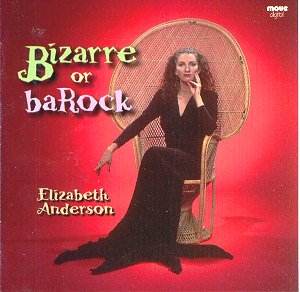BIZARRE OR BAROCK
1 Willard Palmer - (born 1917) Ragtime
(1977)
2 Willard Palmer - Blues for harpsichord
(1917)
3 Traditional - Scarborough Fair (arranged Donald
Angle, 1995)
4 Isaac Albeniz (1850 - 1909) - Leyenda: Asturias
(arranged Anderson 1995)
5 Johann Sebastian Bach (1685 - 1750) -
Small Prelude in C minor (BWV
999)
6 Jean Francois Dandrieu (1684 - 1740) The Lyre
of Orpheus
7 Louis Claude Daquin (1694 - 1772) The
Cuckoo
8 Mary Mageau (born 1934) Winter's Shadow (Brisbane,
1984)
9 Lawrence Whiffin (born 1930) Cycles 1 (Melbourne,
1978)
10 Donald Angle (born 1943) Chocolate Bunnies
(1995)
11 György Ligeti (born 1923) Hungarian
Rock (1978)
12 Henry Purcell (1659-95) A New Ground
(1689)
13 Georg Frideric Handel (1685 1757) The Harmonious
Blacksmith (1720)
14 John Lennon (1940 80) / Paul McCartney (born 1942)
Eleanor Rigby (arranged Donald Angle,
1995)
15 William Albright (born 1944) Fancy No IV
- Danza Ostinata (1979)
16 Diego da Conceição (16?? 17??)
Batalha (1695)
17 Earle Brown (born 1926) Nine Rarebits
(1965)
18 Domenico Scarlatti (1685 1759) Sonata in
d minor Prestissimo K517
19 Domenico Scarlatti Sonata in a minor Allegro
K175 .
20 George Gershwin (1898-1937) 1 got Rhythm
(arranged Angle 1995)
 Elizabeth Anderson
(harpsichord)
Elizabeth Anderson
(harpsichord)
With Kylie Davies (d.bass) and Danny Fischer (drums)
Recorded - Australia 1997
 MOVE MD3179 [69.46]
distributed by "the divine
art"
MOVE MD3179 [69.46]
distributed by "the divine
art"
AmazonUK
AmazonUS
Amazon
recommendations

This is a most unusual CD which explores harpsichord music across four centuries
and includes Baroque, Spanish, Gershwin, modernistic and rock/jazz inspired
items.
Elizabeth Anderson became famous as a harpsichordist in Australia where she
performed solo and concerto works and had recorded Bach's "Goldberg Variations".
She has also made a large number of European tours. This recording had developed
from the popularity of some of the short pieces she had used as encores at
her concerts.
The earliest piece is "Batalka" written in 1695 by the Portuguese composer
Conceição which is particularly interesting because of its
complex rhythms of Iberian/African Origin. The Bach "Small Prelude" is a
little gem. Purcell's "A new ground" and Handel's "The harmonious blacksmith"
are played well. "The Cuckoo" by Daquin is an attractive pastoral piece complete
with cuckoo calls. The two Scarlatti sonata movements are from the traditional
harpsichord repertoire and are despatched with aplomb.
"Leyenda: Asturias" by Albéniz was written for the piano, but in fact,
translates extremely well to the harpsichord because it is rich in guitar-like
sonorities which sound well with the plucked string mechanism of the harpsichord.
The music from the twentieth century played here is really mixed bag. Palmer's
"Ragtime" is a typical Joplin-like rag which for me was spoilt by overloud
and insensitive drumming. This also marred "Blues" although in part this
was redeemed by sensitive playing on the double bass by Kylie Davies. Angle's
arrangement of "Scarborough Fair" also had fine bass playing but overall
did not sound as interesting as this tune can sound. "Winter's Shadow" by
Mary Mageau featured wind chimes and was very atmospheric. William Albright's
"Danza Ostinata" is a wild dance where the harpsichord is used largely as
a percussion instrument with Spanish and boogie-woogie elements - different!
Lawrence Whiffin's "Cycles 1" was given its first performance by Elizabeth
Anderson in 1981 - its elaborate construction is explained in the CDs notes
but frankly it sounds rather like aimless doodling on the keyboard. Ligeti's
"Hungarian Rock" has a monotonous recurrent theme on the left hand whilst
the right hand plays jazz and rock elements - it sounds more interesting
than this description suggests. Earle Brown's "Nine Rarebits" features two
harpsichords (both played here by Elizabeth Anderson by multiple tracking
recording) this is a very strident piece which demonstrates just how unpleasant
the harpsichord can sound when really hammered.
Angle's original composition "Chocolate bunnies" has a boogie-type rhythm
and like his arrangement of "Elenor Rigby" is rather spoilt for me by the
percussion. The CD finishes in fine form with Gershwin's "I got rhythm".
The pieces are played in what appears to be a random order so that for example
Ligeti is followed by Purcell and this kind of juxtaposition can be hard
on the ears. The harpsichord playing by Elizabeth Anderson cannot be faulted
and the CD is attractively presented and has good notes by Ms. Anderson herself.
Overall an interesting and unusual collection, but one which is best heard
by sampling rather than playing complete in one sitting.
Arthur Baker.

